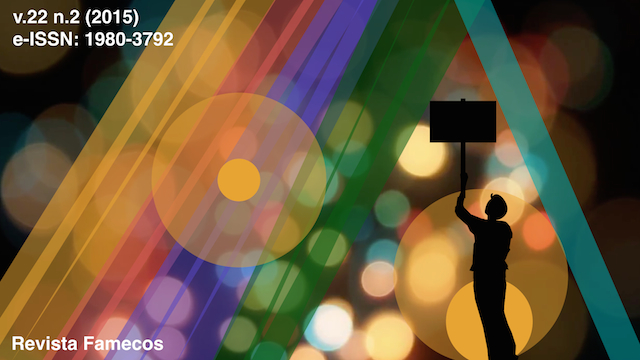Among loopholes, cuts and deletions: relations ethnic-racial and film censorship in the military dictatorship
DOI:
https://doi.org/10.15448/1980-3729.2015.2.19927Keywords:
Cinema, Military Dictatorship, CensorshipAbstract
This paper aims to analyze how the Brazilian censorship analyzed movies during the military regime between 1964 and 1985. More precisely, we discuss the cases of four films: Macunaíma (Joaquim Pedro de Andrade, 1969), Iracema, uma transa amazônica (Jorge Bondanzky and Orlando Senna, 1974), Compasso de Espera (Antunes Filho, 1975) and Tenda dos Milagres (Nelson Pereira dos Santos, 1976). Based on these cases, we seek to establish to what extent the representation of ethnic/racial conflict situations bothered agents of censorship at that time, since the regime was clearly guided by the doctrines of the Portuguese-tropicalism and of the national- development.Downloads
References
ALBUQUERQUE JR., Durval Muniz de. A Invenção do Nordeste e outras artes. Recife: Fundação Joaquim Nabuco; Massangana; São Paulo: Cortez, 2006.
APPADURAI, Arjun. The Past as a scarce resource. Man, v. 16, n. 2, 1981, p. 201-219.
BARTH, Fredrik. O guru, o iniciador e outras variações antropológicas. Rio de Janeiro: Contracapa, 2000.
BHABHA, Homi. O Local da Cultura. Belo Horizonte: Ed. UFMG, 2005.
BOURDIEU, Pierre. O Poder Simbólico. São Paulo, Bertrand Brasil, 2006.
CARVALHO, Noel dos Santos. Cinema e representação racial: o Cinema Negro de Zózimo Bulbul. Tese (Doutorado em Sociologia) - Programa de Pós-Graduação em Sociologia da Universidade de São Paulo, 2006.
CERTEAU, Michel de. A invenção do cotidiano: artes de fazer. Petrópolis: Vozes, 1994.
CHOR, Marcos. A História do Projeto UNESCO: estudos raciais e ciências sociais no Brasil. Tese (Doutorado) - Instituto Universitário de Pesquisas do Estado do Rio de Janeiro (IUPERJ), 1997.
ELIAS, Norbert & SCOTSON, Joan. Os Estabelecidos e os Outsiders. Rio de Janeiro: Jorge Zahar, 2000.
GUIMARÃES, Antônio Sérgio Alfredo. Classes, raças e democracia. São Paulo, Ed. 34, 2002.
LAPERA, Pedro Vinicius Asterito. A presença de “Iracema, uma transa amazônica” (1974) no cinema brasileiro. In: E-compós, Brasília, v. 11, n. 2, maio/ago 2008. Disponível em:
http://www.compos.org.br/seer/index.php/e-compos/article/view/304/280 < Acesso em 20 dez 2014 >
PINTO, Leonor E. Souza. Le cinema brésilien au risque de la censure imposée pendant la dictature militaire de 1964 à 1985. Tese (Doutorado) - École Supérieure d´Audiovisuel da Université de Toulouse, 2001. Disponível em: www.memoriacinebr.com.br
______. La résistance du cinema brésilien face à la censure imposée par le régime militaire au Brésil - 1964 / 1988. 2006. Disponível em www.memoriacinebr.com.br
______. Macunaíma: 16 anos de luta contra a censura. 2007. Disponível em: www.memoriacinebr.com.br
SIMÕES, Inimá. Roteiro da intolerância: a censura cinematográfica no Brasil. São Paulo: SENAC, 2004.
Downloads
Published
How to Cite
Issue
Section
License
Copyright
The submission of originals to Revista Famecos implies the transfer by the authors of the right for publication. Authors retain copyright and grant the journal right of first publication. If the authors wish to include the same data into another publication, they must cite Revista Famecos as the site of original publication.
Creative Commons License
Except where otherwise specified, material published in this journal is licensed under a Creative Commons Attribution 4.0 International license, which allows unrestricted use, distribution and reproduction in any medium, provided the original publication is correctly cited.






